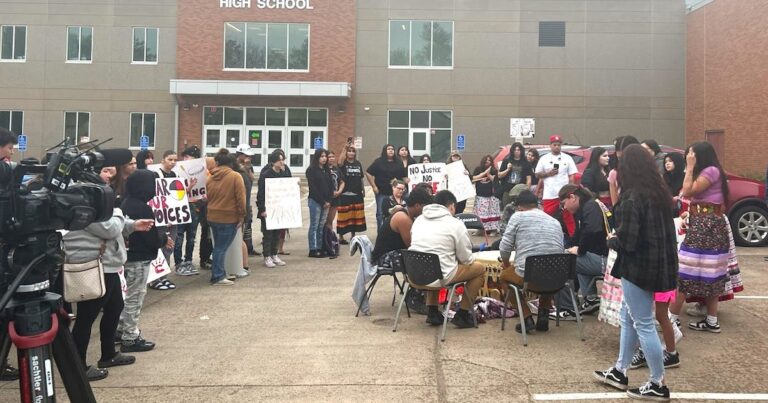DULUTH – Students in a central Minnesota school district walked out Wednesday in protest of a decision to ban a tribal drumming group from graduation, a blow to Native American students who make up about a third of the graduating class.
The Hinckley-Finlayson School District board voted Monday, with the advice of legal counsel, to stop the drumming group, which wanted to perform Ojibwe travel songs and was part of last year’s ceremony. The district will no longer allow them or any other extracurricular groups to perform.
According to a memo sent to the committee, lawyers for the school district cited the First Amendment’s separation of church and state clause, which says the government must remain neutral on religious matters.
“It’s demoralizing,” said Kaiya Wilson, a senior graduating this month. “I feel like the school is sending the message that we can pick and choose the culture and the people that we want in our school.”
The neighboring Mille Lacs Ojibwe tribe argues that the music of their drumming group is cultural rather than religious, pointing to state universities such as the University of Minnesota Duluth that incorporate drumming groups into their ceremonies.
“The tradition of playing tribal drums at graduation ceremonies honors our students and gives them a sense of accomplishment and homeland honor,” Mille Lacs Band CEO Melanie Benjamin said in a statement. “We thought we had reached a point where we no longer needed to fight these battles. It appears we were wrong.”
Schools Superintendent Brian Masterson declined to comment but issued a statement on behalf of the district, which says the decision was not made lightly and that the drum group was given the opportunity to perform in the school’s fine arts center after the ceremony on May 24. The district is about 80 miles north of the Twin Cities.
“The district’s goal for graduation is to celebrate all of the district’s senior students and the families and community members who have supported them throughout their academic journey,” the statement said, adding that removing performances by extracurricular groups will ensure “the ceremony remains focused on the graduates.”
Nearly a quarter of the district’s 950 students this year are Native American, and about 20 of them are expected to graduate. Graduation rates for Native American students are historically low, reflecting the federal government’s history of forcing generations of Native Americans into boarding schools that stripped them of their culture and language.
The graduation rate for Native American students in Minnesota is 61 percent. In Hinckley, it’s nearly 80 percent.
Niyo Gonzalez, a member of the St. Croix Chippewa Indian Nation of Wisconsin who has two children in the district, said the exclusion disrespects Native American culture and the hard-won successes of Native students.
“We think about how difficult it is to live in America’s highly Westernized education system,” she says, “and to survive in it. [graduation] This is a great achievement. … So if you are going to play music that represents your culture in a public ceremony, you are choosing which culture to represent. We want our culture to be a part of it.”
Wilson, who plans to attend the University of Minnesota Twin Cities campus next year to study psychology and American Indian studies, is a member of the Michigan-based Grand Traverse Band of Ottawa Chippewa Indians. She has started an online petition to bring back the show.
“A lot of people have been hurt by this,” she said.
The school board memo also cited disruptions from people approaching the ceremony to watch the performance, requests by other groups to perform and respect for people’s time. The statement listed ways the district supports Native American students, including a spring assembly and a recently adopted smudging policy that recognizes culturally significant Native American practices.

